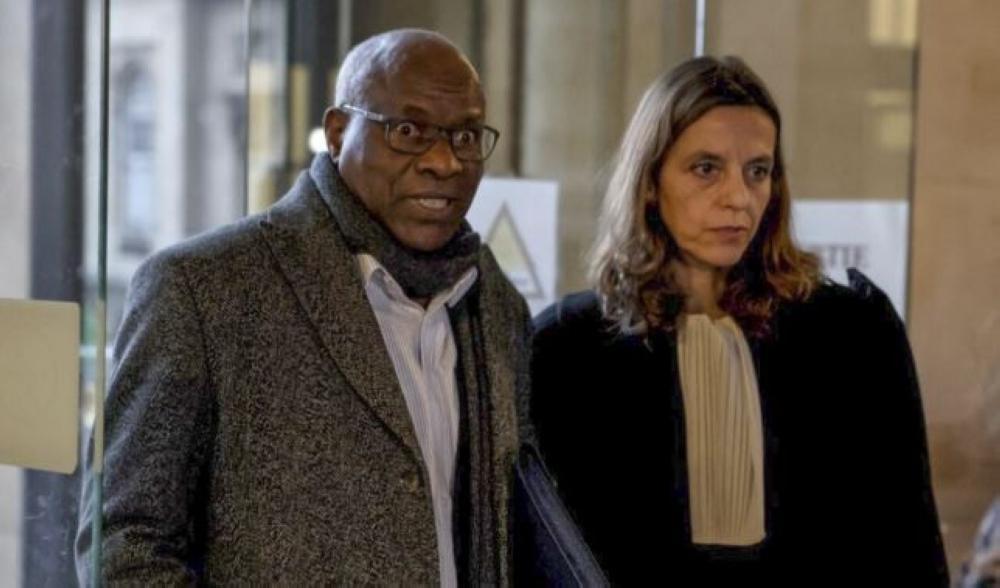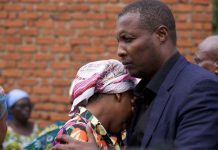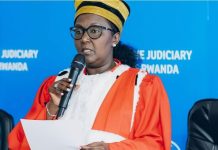Africa-Press – Rwanda. When 66-year-old Jean Marie Vianney Gashugi returned to his home in Tumba on July 11, 1994, silence and ruin greeted him. His house had been torn down, the land divided among others, and even cannabis grew where his family once lived.
“I didn’t find anyone alive,” he recalls quietly. “They had all been killed. I just sat there, staring at what used to be our home.”
Three months earlier, he had fled for his life as the Genocide against the Tutsi engulfed the southern town of Huye. Behind much of the horror in Tumba stood a man Gashugi once knew — Dr. Sosthène Munyemana, a respected gynaecologist and university lecturer who would later earn the grim title, “The Butcher of Tumba.”
Last week, three decades later, a Paris court upheld Munyemana’s 24-year sentence for genocide, crimes against humanity, and complicity in genocide. For Gashugi, who survived the nightmare that took his entire family, the verdict brought a quiet measure of peace.
“Even if they sentence him for just one year,” he says, “what matters is that his crimes are now known world-wide. Justice was served.”
The neighbour who became a killer
Gashugi knew Munyemana before the apocalypse descended. They weren’t close friends, but in Tumba’s tight-knit community, their paths crossed regularly. Munyemana, an educated gynecologist who had studied in France, would visit Gashugi’s elder brother during holidays.
Sometimes they would reciprocate, walking to Munyemana’s home nearby—a house that would later be auctioned by courts to compensate for the property its owner destroyed
The transformation began around 1993, when the extremist MDR Power movement gained traction. Gashugi witnessed it with his own eyes: Munyemana standing at Opprovia, near the station by Focal Hotel in Butare City (now Huye District), his left arm raised for two hours, “MDR Power” scrawled in red marker on his skin like a brand.
“He had already changed a lot by then and had stopped visiting us,” Gashugi recalled. “He knew that I was capable of going into the forest to visit others and coming back safely, so he avoided me.”
When the killings began, Munyemana allegedly played a central role. Witnesses, including Gashugi, testified that he organised attacks, manned roadblocks, and locked hundreds of Tutsi inside the Tumba sector office — where many were tortured and killed.
By April 17, 1994, when a fateful meeting took place at the Tumba Sector office among members of the so-called Comité de Crise, where Munyemana served as an advisor and included Simeon Remera, a CDR president, and Vincent Murekezi, later sentenced to life imprisonment, he had become something else entirely.
Gashugi didn’t attend—the fear gripping most Tutsis kept him away—but he lingered near a nearby house, close enough to overhear the chilling discussions. What he heard made him decide to flee for his life.
Around April 20, 1994, Munyemana took the sector office key, brought people inside, locked the doors, and supervised their murders. About 300 people were killed, their bodies grotesquely mutilated. Munyemana, witnesses testified, kept lists of Tutsis to be killed and personally followed up to confirm their deaths.
“He had the sector key,” Gashugi recounts. “Some victims were injected with needles everywhere before being murdered. We saw the bodies later, it was horrific.”
Throughout his 2023 trial in France and the appeal hearings that concluded this month, Munyemana maintained his innocence. His defense team presented him as an exemplary doctor, a compassionate man who rescued people rather than harmed them.
His wife and son testified on his behalf. French colleagues called him a man of integrity.
But over 40 witnesses contradicted this narrative. One defense witness even admitted being asked by her aunt to provide false testimony for Munyemana—a revelation that sparked chaos in the Paris courtroom.
For Gashugi and others in Tumba, the verdict is less about revenge than recognition. “He called us liars,” Gashugi says of Munyemana. “But now the truth has been told.”
“Justice came late,” he says, “but it came. And that means everything.”
Justice that crosses borders
For Ibuka leaders in Huye, the French court’s decision marked another important step in a long fight for accountability.
“Our relatives will never return, but seeing justice done against someone who committed such atrocities in Tumba gives us some peace,” said Marie Claire Uwamahoro, Ibuka president in Tumba Sector, where Munyemana lived before and during the genocide against the tutsi.
Théodat Siboyintore, President of Ibuka in Huye District, said the verdict sends a clear message that genocide crimes have no expiry.
“Seeing him tried and convicted brings justice to survivors,” he said. “It reaffirms that those who took part in the genocide cannot escape justice, wherever they are.”
Siboyintore acknowledged the government’s efforts to bring genocide perpetrators to justice but urged foreign countries to extradite fugitives to Rwanda, so they can stand trial before survivors and be confronted with the atrocities they committed, a step, he said, that would greatly contribute to the healing process.
For More News And Analysis About Rwanda Follow Africa-Press






